Unit6 I'm watching TV-Section A 1a-2d课件(共40张PPT)
文档属性
| 名称 | Unit6 I'm watching TV-Section A 1a-2d课件(共40张PPT) | 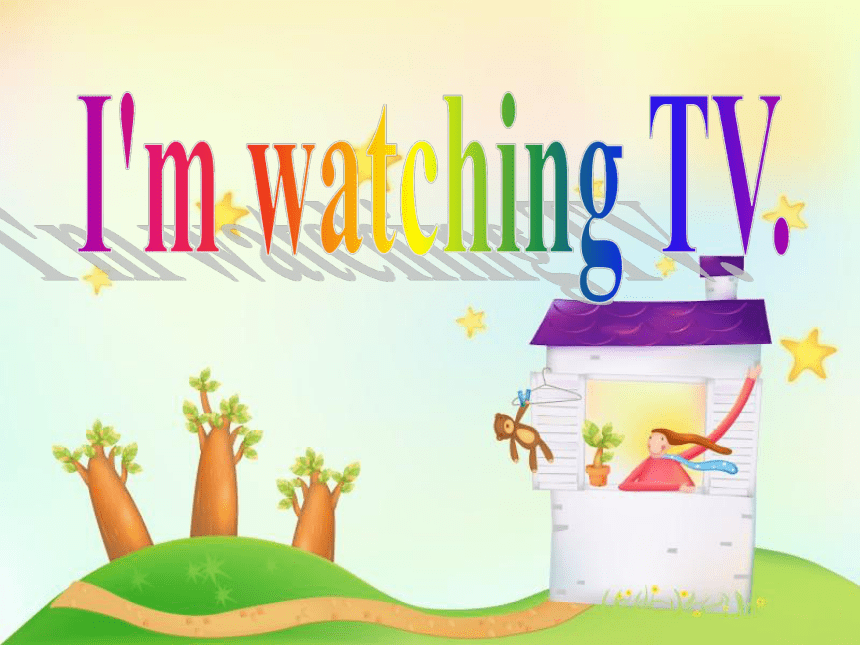 | |
| 格式 | ppt | ||
| 文件大小 | 3.3MB | ||
| 资源类型 | 教案 | ||
| 版本资源 | 人教新目标(Go for it)版 | ||
| 科目 | 英语 | ||
| 更新时间 | 2022-06-13 16:43:25 | ||
图片预览

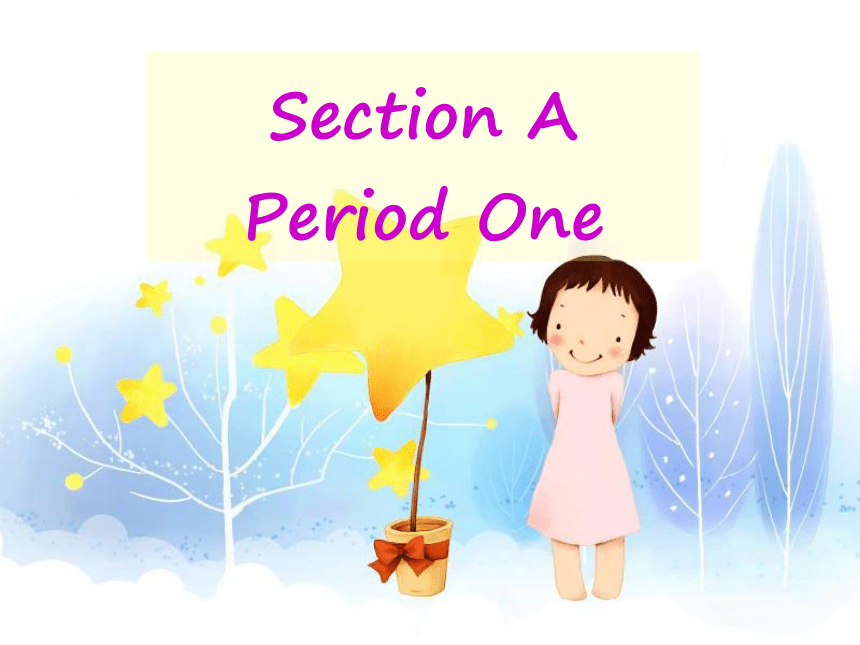
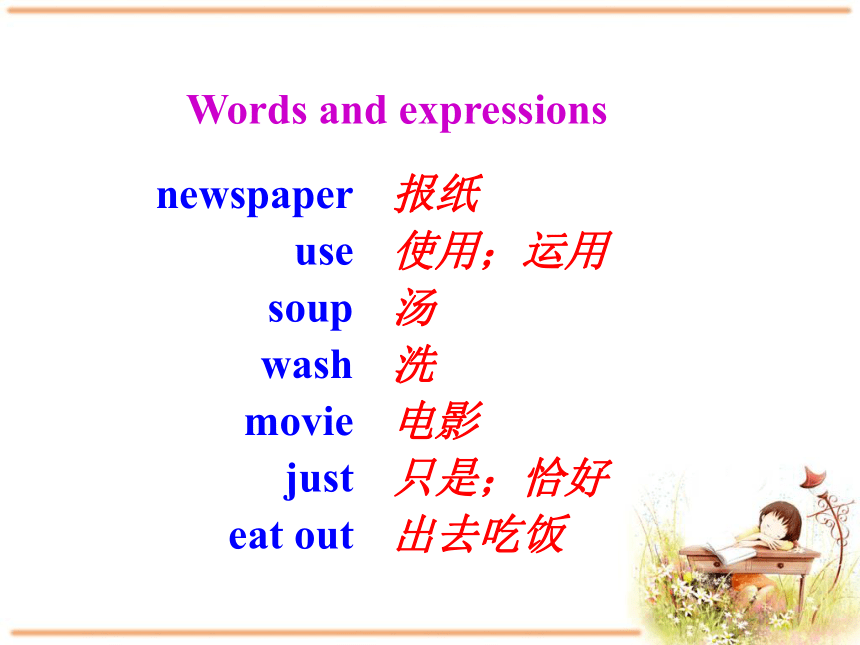
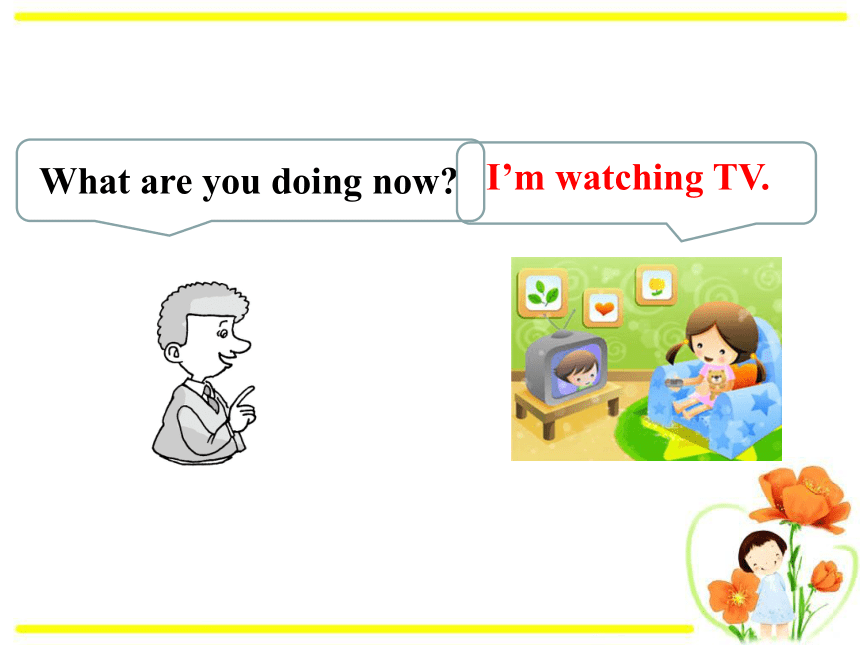
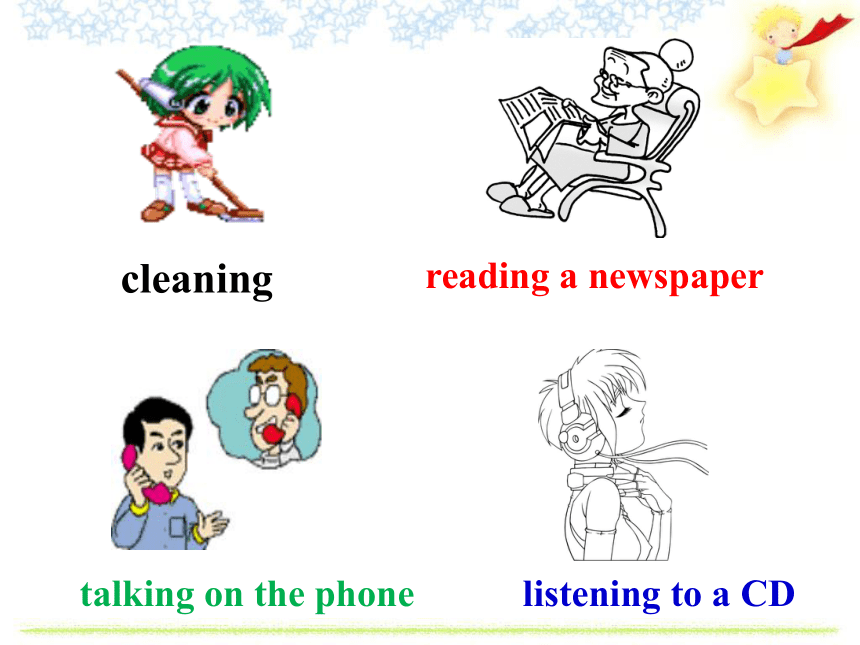
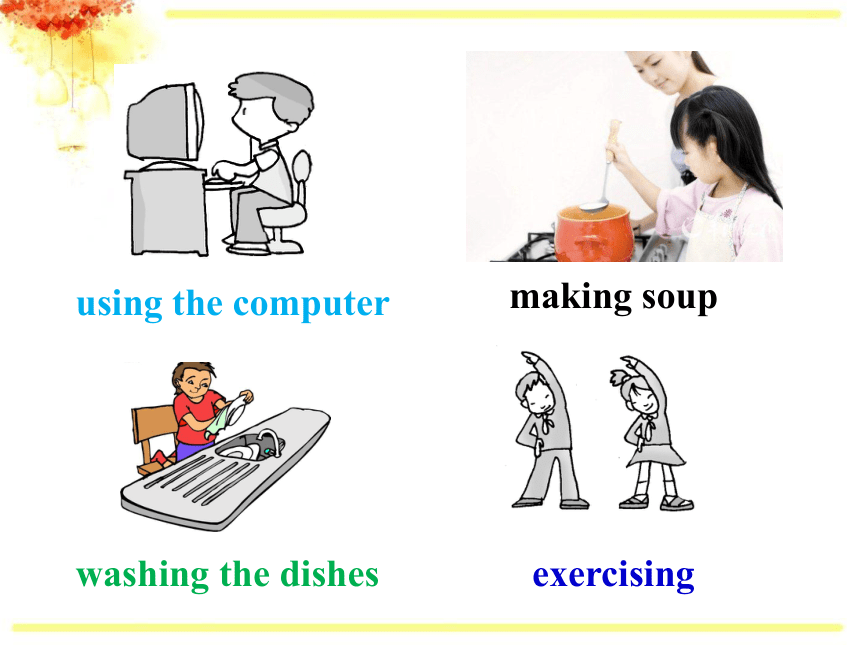


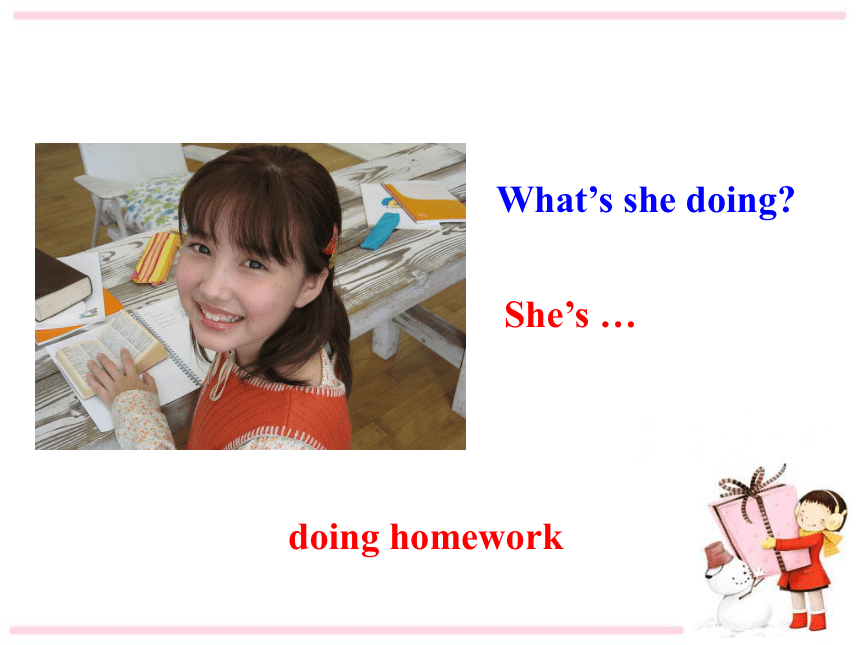
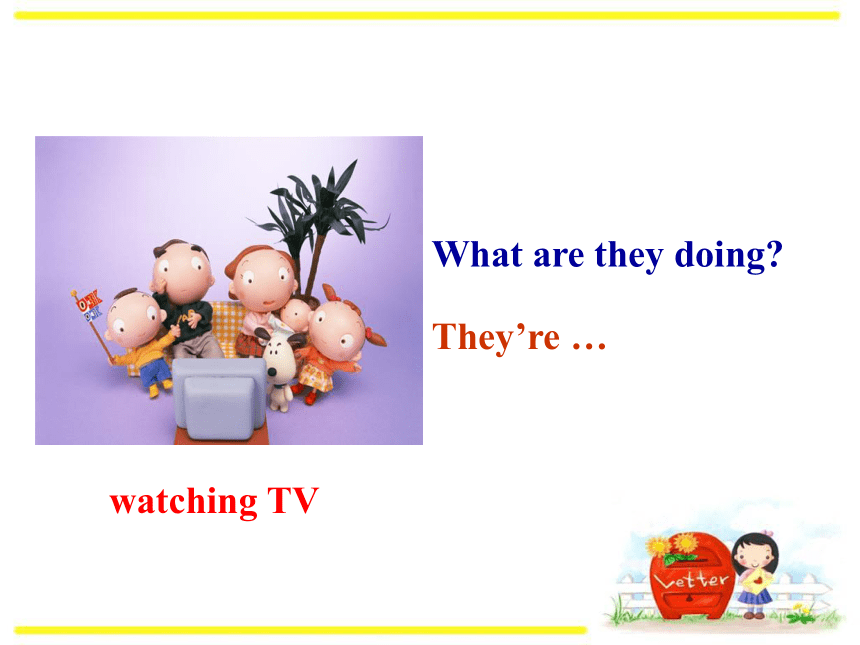
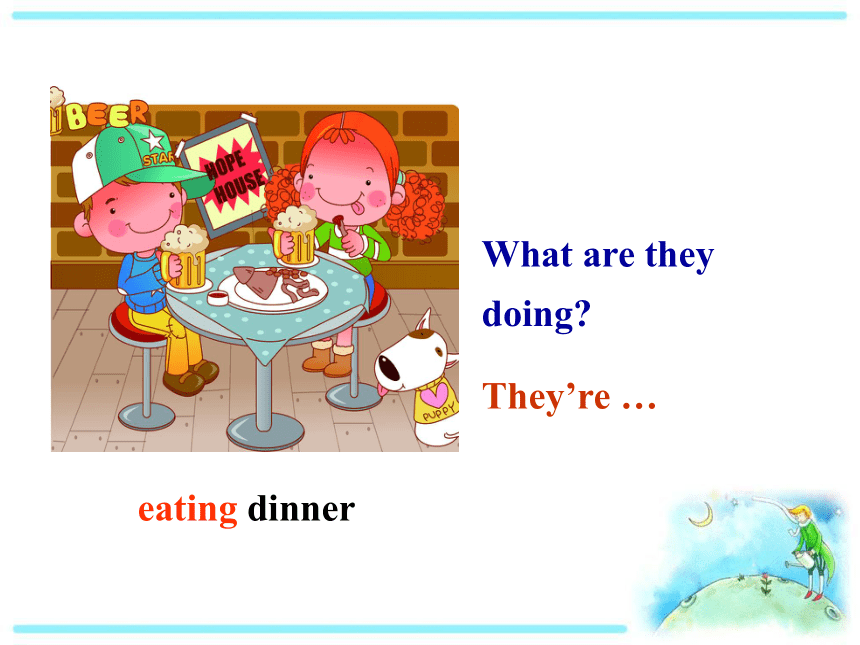
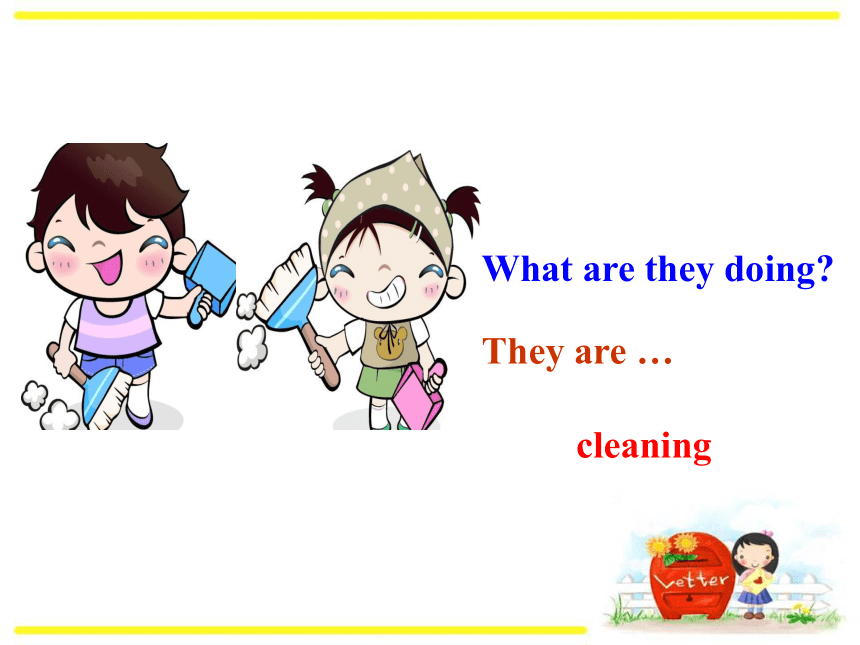
文档简介
(共40张PPT)
Section A
Period One
Words and expressions
newspaper
use
soup
wash
movie
just
eat out
报纸
使用;运用
汤
洗
电影
只是;恰好
出去吃饭
What are you doing now
I’m watching TV.
cleaning
listening to a CD
reading a newspaper
talking on the phone
exercising
making soup
washing the dishes
using the computer
What are they doing
talking on the phone
What’s he doing
He’s …
What’s she doing
She’s …
doing homework
watching TV
What are they doing
They’re …
eating dinner
What are they doing
They’re …
cleaning
What are they doing
They are …
1a
Match the activities with the pictures.
1. watching TV __
2. cleaning __
3. reading a newspaper __
4. talking on the phone __
5. listening to a CD __
6. using the computer __
7. making soup ___
8. washing the dishes __
9. exercising ___
a
g
d
i
h
e
c
b
f
1b
Listen. What are these people doing
Write the numbers from 1a.
a. Jenny ____ b. John _____
c. Dave and Mary ____
1
8
5
1c
Ask and answer questions about what people are doing in 1a.
A: What’s he doing
B: He’s using the computer.
A: What are they doing
B: They’re listening to a CD.
2a
1. What is Steve
doing
2. What is Jack
doing
a. He is watching TV.
b. He is listening to a
CD.
Listen and match the answers
with the questions.
2b
Listen again. Fill in the blanks.
Jack: Hello, Steve.
Steve: Hi, Jack.
Jack: What ________ you ________, Steve
Steve: I’m ______________. What about you
Jack: I’m ________________, but it’s kind of ________.
Steve: Yeah, my TV show is also not very _________. Do you want to ______ the movies
Jack: That sounds good.
are
doing
watching TV
listening to a CD
boring
interesting
go to
2c
Role-play the conversation in 2b.
2d
Role-play the conversation.
Jenny: Hello This is Jenny.
Laura: Hi, Jenny. It’s Laura here.
Jenny: Oh, hi, Laura. What are you doing
Laura: Not much. I’m just washing my clothes. What about you
Jenny: I’m watching TV. Do you want to join me for dinner My parents aren’t at home. We can eat out.
Laura: Yeah. I’d love to.
Jenny: Let’s meet at my home e at half past six.
Laura: OK. See you then.
Jenny: What are you doing
珍尼:你在干什么呢?(你忙什么呢 )
Laura: Not much.
劳拉:没忙什么。
Not much是用做回答的交际套语,还可说成 Nothing much, 相当于汉语“不忙什么;没什么事”,表示自己有空。例如:
A:What are you doing this evening
你今晚要做什么事?
B:Well, nothing much.
嗯,没什么事。
2. Do you want to join me for dinner
你想跟我一起吃个饭吗?
join somebody for something 表示“与某人一起做某事;参与或加入到某人的行列中一起做某事”。例如:
Would you come and join us for a cup of coffee We need to talk to you.
你来跟我们喝杯咖啡好吗? 我们要跟你谈一谈。
join / join in 的区别
例如:
He joined the League in 1985.
他在1985年入团。
I hope you’ll all join in the discussion.
我希望你们大家都参加讨论。
join 指加入某党派、某组织或某社会团体,以及参军等,还可表示参与某种活动。
例句:
I will never forget the day when I joined the Party.
我永远也忘不了入党的那一天。
join in 通常指参加某种活动,尤其指和其他人一起参加某项活动。例句:
May I join in the game
我可以参加这个比赛吗?
用 join 和 join in 的适当形式填空。
1. We are playing football. Do you want to __________
2. You are welcome to _________ us.
3. He is against letting girls ________ the club.
join in
join
join
3. I’d love to.
我很乐意。
1) 作为一个交际应答套语,I’d love to 经常用于礼貌地接受他人邀请,还可说成I’d like to, 但语气较前者稍弱。例如:
A:Would you like to come with us to the show
你愿意跟我们一起去看表演吗?
B:Thanks. I’d like to.
多谢了,我可以的。
2) 当婉言拒绝他人邀请时,英语多用I’d love to, but … 或Sorry, I’m afraid I can’t because …等。例如:
A:I’m going to town. Would you like to join me
我进城去,你想跟我一同去吗?
B:Sorry, I’m afraid I can’t because I still have lots of homework to do.
真抱歉,恐怕我去不成,我还有好多作业要做。
现在进行时态
1. 定义:表示现在正在进行的动作。
2. 构成:am( is, are) + 动词的现在分词
The Present Continuous Tense
动词现在分词的构成规律
1) 一般情况下,在动词原形后直接加-ing。如:
work—working do—doing play—playing
2) 以不发音的字母e结尾的动词,去掉e,再加-ing. 如:
dance—dancing come—coming
3) 重读闭音节单词,如果末尾只有一个辅音字母,则双写这一字母,再加-ing。如:
get—getting shop—shopping
run—running swim—swimming
Do you know how to get “ -ing” Let’s try !
do ______ watch ______
clean ______ read______
eat______ play________ dance________ write ________
run _________ swim _________
watching
doing
cleaning
playing
writing
reading
running
swimming
eating
dancing
一般现在时与现在进行时
现在进行时是表示一个动作正在发生或进行。
一般现在时表示现在的状态或经常的,习惯性的动作。
一般现在时的功用
1. 表示一直发生的事情、经常发生的动作:
Nurses look after patients in hospitals.
Excuse me, do you speak English
I get up at 8 o’clock every morning.
It often rains in summer in Beijing.
2. 表示客观事实或者真理:
Birds fly.
The earth goes around the sun.
3. 谈论时间表、旅程表等:
What time does the film begin
The football match starts at 8 o’clock.
Tomorrow is Thursday.
4. 谈论籍贯、国籍等:
—Where do you come from
—I come from China.
—Where do you come from
—I come from Guangzhou.
5. 询问或者引用书籍、通知或新近接到的信笺内容:
What does that notice say
—What does Ann say in her letter
—She says she’s coming to Beijing next week.
Shakespeare says, “Neither a borrower or a lender be.”
Section A
Period One
Words and expressions
newspaper
use
soup
wash
movie
just
eat out
报纸
使用;运用
汤
洗
电影
只是;恰好
出去吃饭
What are you doing now
I’m watching TV.
cleaning
listening to a CD
reading a newspaper
talking on the phone
exercising
making soup
washing the dishes
using the computer
What are they doing
talking on the phone
What’s he doing
He’s …
What’s she doing
She’s …
doing homework
watching TV
What are they doing
They’re …
eating dinner
What are they doing
They’re …
cleaning
What are they doing
They are …
1a
Match the activities with the pictures.
1. watching TV __
2. cleaning __
3. reading a newspaper __
4. talking on the phone __
5. listening to a CD __
6. using the computer __
7. making soup ___
8. washing the dishes __
9. exercising ___
a
g
d
i
h
e
c
b
f
1b
Listen. What are these people doing
Write the numbers from 1a.
a. Jenny ____ b. John _____
c. Dave and Mary ____
1
8
5
1c
Ask and answer questions about what people are doing in 1a.
A: What’s he doing
B: He’s using the computer.
A: What are they doing
B: They’re listening to a CD.
2a
1. What is Steve
doing
2. What is Jack
doing
a. He is watching TV.
b. He is listening to a
CD.
Listen and match the answers
with the questions.
2b
Listen again. Fill in the blanks.
Jack: Hello, Steve.
Steve: Hi, Jack.
Jack: What ________ you ________, Steve
Steve: I’m ______________. What about you
Jack: I’m ________________, but it’s kind of ________.
Steve: Yeah, my TV show is also not very _________. Do you want to ______ the movies
Jack: That sounds good.
are
doing
watching TV
listening to a CD
boring
interesting
go to
2c
Role-play the conversation in 2b.
2d
Role-play the conversation.
Jenny: Hello This is Jenny.
Laura: Hi, Jenny. It’s Laura here.
Jenny: Oh, hi, Laura. What are you doing
Laura: Not much. I’m just washing my clothes. What about you
Jenny: I’m watching TV. Do you want to join me for dinner My parents aren’t at home. We can eat out.
Laura: Yeah. I’d love to.
Jenny: Let’s meet at my home e at half past six.
Laura: OK. See you then.
Jenny: What are you doing
珍尼:你在干什么呢?(你忙什么呢 )
Laura: Not much.
劳拉:没忙什么。
Not much是用做回答的交际套语,还可说成 Nothing much, 相当于汉语“不忙什么;没什么事”,表示自己有空。例如:
A:What are you doing this evening
你今晚要做什么事?
B:Well, nothing much.
嗯,没什么事。
2. Do you want to join me for dinner
你想跟我一起吃个饭吗?
join somebody for something 表示“与某人一起做某事;参与或加入到某人的行列中一起做某事”。例如:
Would you come and join us for a cup of coffee We need to talk to you.
你来跟我们喝杯咖啡好吗? 我们要跟你谈一谈。
join / join in 的区别
例如:
He joined the League in 1985.
他在1985年入团。
I hope you’ll all join in the discussion.
我希望你们大家都参加讨论。
join 指加入某党派、某组织或某社会团体,以及参军等,还可表示参与某种活动。
例句:
I will never forget the day when I joined the Party.
我永远也忘不了入党的那一天。
join in 通常指参加某种活动,尤其指和其他人一起参加某项活动。例句:
May I join in the game
我可以参加这个比赛吗?
用 join 和 join in 的适当形式填空。
1. We are playing football. Do you want to __________
2. You are welcome to _________ us.
3. He is against letting girls ________ the club.
join in
join
join
3. I’d love to.
我很乐意。
1) 作为一个交际应答套语,I’d love to 经常用于礼貌地接受他人邀请,还可说成I’d like to, 但语气较前者稍弱。例如:
A:Would you like to come with us to the show
你愿意跟我们一起去看表演吗?
B:Thanks. I’d like to.
多谢了,我可以的。
2) 当婉言拒绝他人邀请时,英语多用I’d love to, but … 或Sorry, I’m afraid I can’t because …等。例如:
A:I’m going to town. Would you like to join me
我进城去,你想跟我一同去吗?
B:Sorry, I’m afraid I can’t because I still have lots of homework to do.
真抱歉,恐怕我去不成,我还有好多作业要做。
现在进行时态
1. 定义:表示现在正在进行的动作。
2. 构成:am( is, are) + 动词的现在分词
The Present Continuous Tense
动词现在分词的构成规律
1) 一般情况下,在动词原形后直接加-ing。如:
work—working do—doing play—playing
2) 以不发音的字母e结尾的动词,去掉e,再加-ing. 如:
dance—dancing come—coming
3) 重读闭音节单词,如果末尾只有一个辅音字母,则双写这一字母,再加-ing。如:
get—getting shop—shopping
run—running swim—swimming
Do you know how to get “ -ing” Let’s try !
do ______ watch ______
clean ______ read______
eat______ play________ dance________ write ________
run _________ swim _________
watching
doing
cleaning
playing
writing
reading
running
swimming
eating
dancing
一般现在时与现在进行时
现在进行时是表示一个动作正在发生或进行。
一般现在时表示现在的状态或经常的,习惯性的动作。
一般现在时的功用
1. 表示一直发生的事情、经常发生的动作:
Nurses look after patients in hospitals.
Excuse me, do you speak English
I get up at 8 o’clock every morning.
It often rains in summer in Beijing.
2. 表示客观事实或者真理:
Birds fly.
The earth goes around the sun.
3. 谈论时间表、旅程表等:
What time does the film begin
The football match starts at 8 o’clock.
Tomorrow is Thursday.
4. 谈论籍贯、国籍等:
—Where do you come from
—I come from China.
—Where do you come from
—I come from Guangzhou.
5. 询问或者引用书籍、通知或新近接到的信笺内容:
What does that notice say
—What does Ann say in her letter
—She says she’s coming to Beijing next week.
Shakespeare says, “Neither a borrower or a lender be.”
同课章节目录
- Unit 1 Can you play the guitar?
- Section A
- Section B
- Unit 2 What time do you go to school?
- Section A
- Section B
- Unit 3 How do you get to school?
- Section A
- Section B
- Unit 4 Don't eat in class.
- Section A
- Section B
- Unit 5 Why do you like pandas?
- Section A
- Section B
- Unit 6 I'm watching TV.
- Section A
- Section B
- Review of Units 1-6
- Unit 7 It's raining!
- Section A
- Section B
- Unit 8 Is there a post office near here?
- Section A
- Section B
- Unit 9 What does he look like?
- Section A
- Section B
- Unit 10 I'd like some noodles.
- Section A
- Section B
- Unit 11 How was your school trip?
- Section A
- Section B
- Unit 12 What did you do last weekend?
- Section A
- Section B
